EV Leaders
Which country is leading the way in the future of electric cars?
With the world becoming more aware of the need for sustainability, DriveElectric wants to answer the question: Who is leading the race in electric vehicle manufacturing?
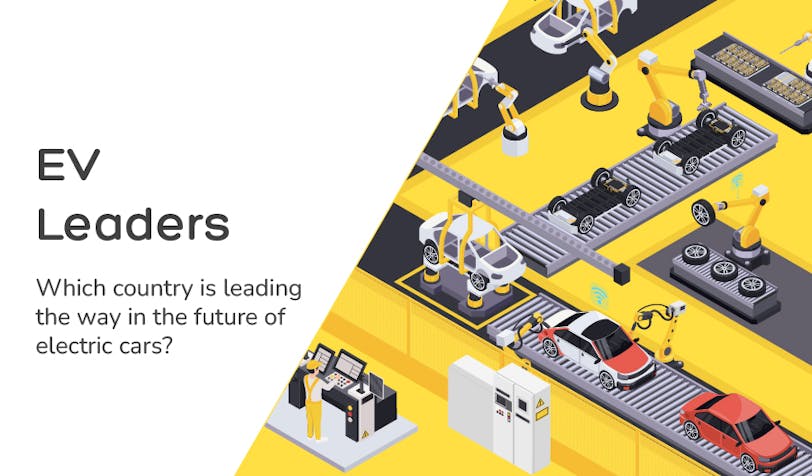
We will look at the countries that have produced the most EVs, the most batteries, annual car production figures, and car sales to reveal the leader of electric vehicle manufacturing.
We will also look at the most accessible countries for EV drivers. By looking at the number of EV chargers and the increase in sales of electric cars, we will reveal the countries that are most ready to adopt electric vehicles.
The Top EV Leaders by Sales and Charging Points
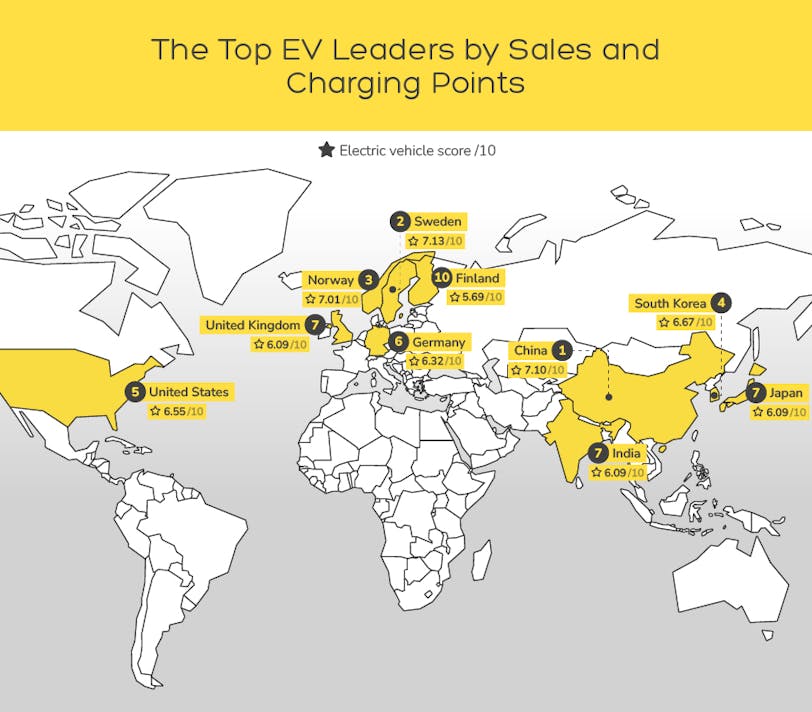
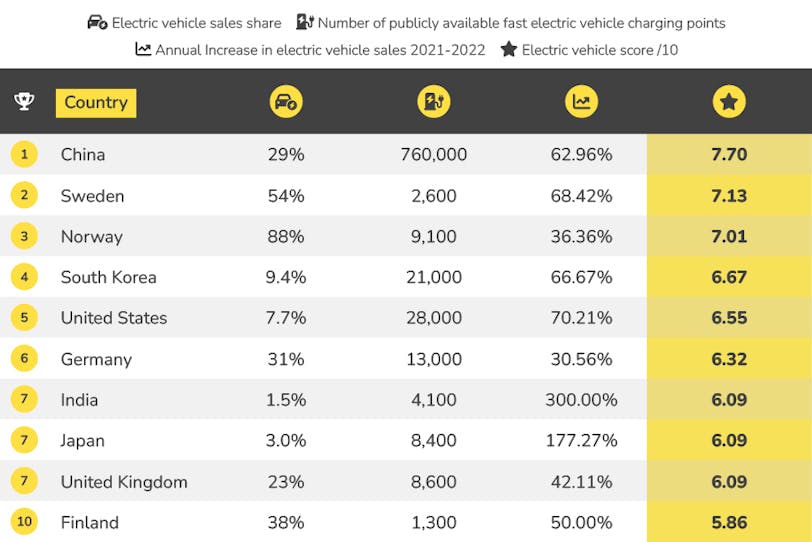
1. China
EV Score: 7.70 out of 10
China recorded the highest score for its EV sales and publicly available fast-charging points. Fast chargers are more than 22 kW and can serve LDVs with power ratings of up to 350 kW. Slow chargers are less than or equal to 22 kW.
While China still has a high level of pollution and reliance on ICE vehicles due to costs for consumers, there are 760,000 charging points across the country, which is nearly six times more than all the other countries’ charging points combined. This is likely a result of policies introduced to encourage the adoption of electric cars in spite of their high cost, with aims for electric vehicles to make up 40% of all cars sold by 2030. Despite these initiatives, the country has an EV sales share of 29%, which is markedly less than other countries.
In June 2023, China unveiled a 520 billion yuan (£57.6 billion) package of tax breaks over four years for electric vehicles and green cars, its biggest yet for the industry as it boosts slower auto sales growth.
2. Sweden
EV Score: 7.13 out of 10
Sweden has a higher share of EV sales than China (54%) but has far fewer EV charging points (2,600 publicly available and fast charging). There was also a higher increase in EV sales in Sweden than in China (68.42% increase between 2021 and 2022), which is expected as Sweden implements plans to be carbon neutral by 2045.
In Sweden, government incentives and legislation have been introduced to increase sales of alternative fuel vehicles. People who own BEVs (battery electric vehicles) pay the lowest amount of road tax (approximately €32) and are exempt from circulation (ownership) tax for five years.
3. Norway
EV Score: 7.01 out of 10
Norway recorded the highest share of EV sales, with the majority of cars sold in the country being electric (88%). The only country with a higher majority of EV sales than other cars was Iceland, at 70%. Norway also has many publicly available fast EV charging stations (9,100 publicly available and fast charging points).
Norway is leading the way for a transition to zero-emission in transport. The Norwegian government has decided on a national goal that all new cars sold by 2025 should be zero-emission (electric or hydrogen).
Political parties in Norway have declared that it should always be economically beneficial to choose zero and low-emission cars over high-emission cars. For a long time, taxes on polluting cars have partly financed incentives for zero-emission cars. Big cars with high emissions are, therefore, very expensive, and this has been adjusted gradually to have more emphasis on emissions and less on weight.
In Norway, EVs have been exempt from both VAT and high purchase tax on new cars. In 2023, a purchase tax based on the electric car’s weight was also introduced.
The Top 10 Countries for EV Battery Manufacturing
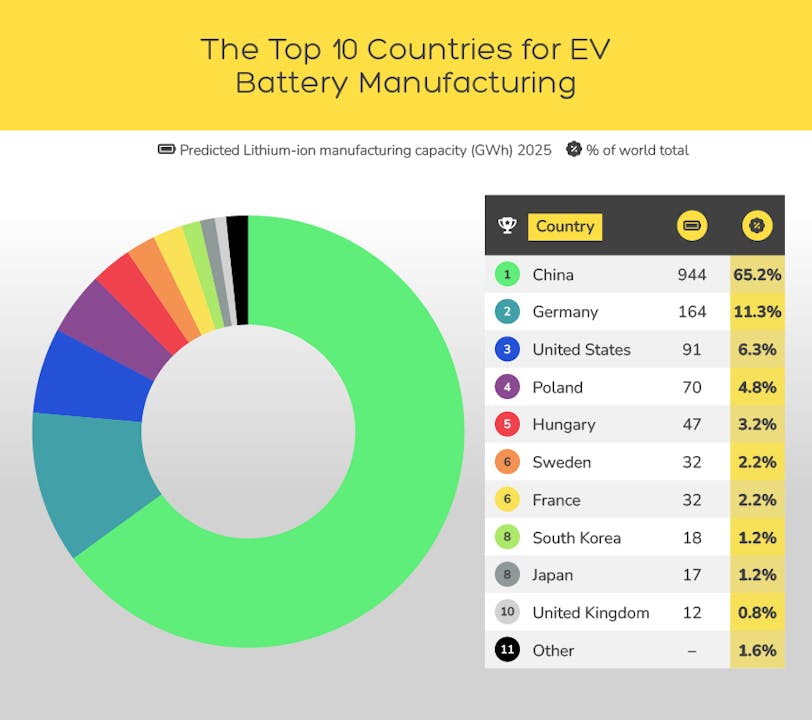
1. China
Percentage of global Lithium-ion manufacturing capacity: 62.5%
China dominates the rest of the world in the race for the most EV battery manufacturing, with nearly 66% of global Li-ion manufacturing capacity. Although China is leading the way, its share of worldwide capacity could drop as other countries accelerate battery production.
2. Germany
Percentage of global Lithium-ion manufacturing capacity: 11.3%
Germany comes in second place with a Lithinum-ion manufacturing capacity of 164. The European country’s EV battery manufacturing is projected to rise further than 164 GWh, representing a 15-fold increase in just four years. This means that Germany could soon outperform China in the battery race.
3. United States
Percentage of global Lithium-ion manufacturing capacity: 6.3%
The US is also expected to double its capacity by 2025, with 13 new plants predicted to be operational in the next five years. It is expected to provide a boost to domestic EV battery manufacturing capabilities.
Top 10 Countries for Car Production
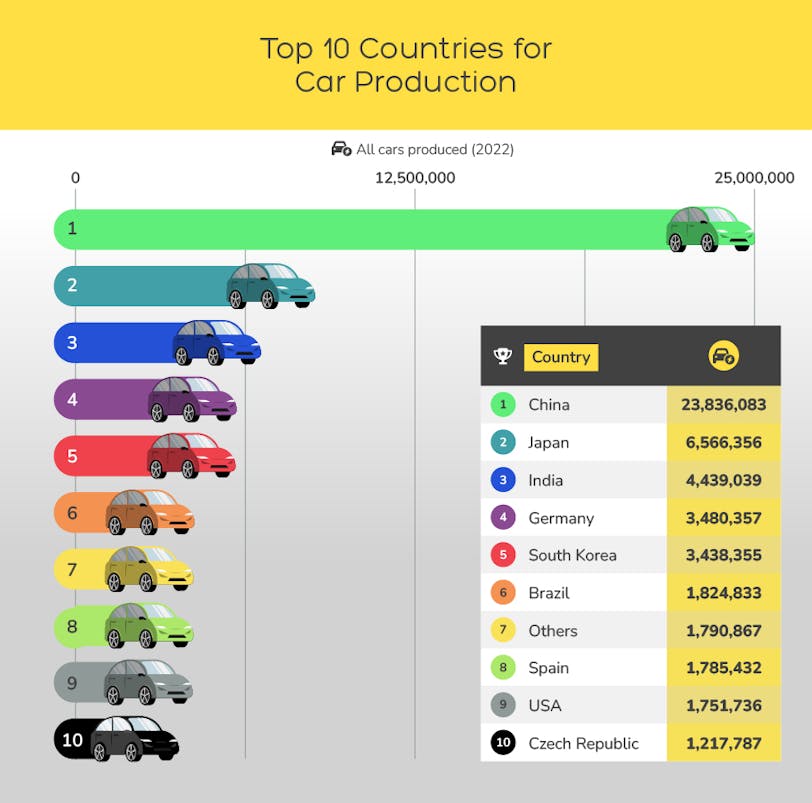
With a production volume of nearly 24 million passenger cars (including both EVs and petrol cars), China ranked first among countries with the largest production of all passenger cars, with nearly 24 million cars manufactured in 2022. On average, every fourth passenger vehicle produced worldwide was produced in China.
China’s soaring vehicle production was rising to meet demand for years. Passenger vehicle sales surged from around seven million in 2008 to almost 24 million units in 2022.
China was followed by Japan (almost 7 million), India (4.4 million), Germany (3.48 million), and South Korea (3.43 million), which are countries home to valuable car brands worldwide.
The Countries with the Most Automobile Manufacturers
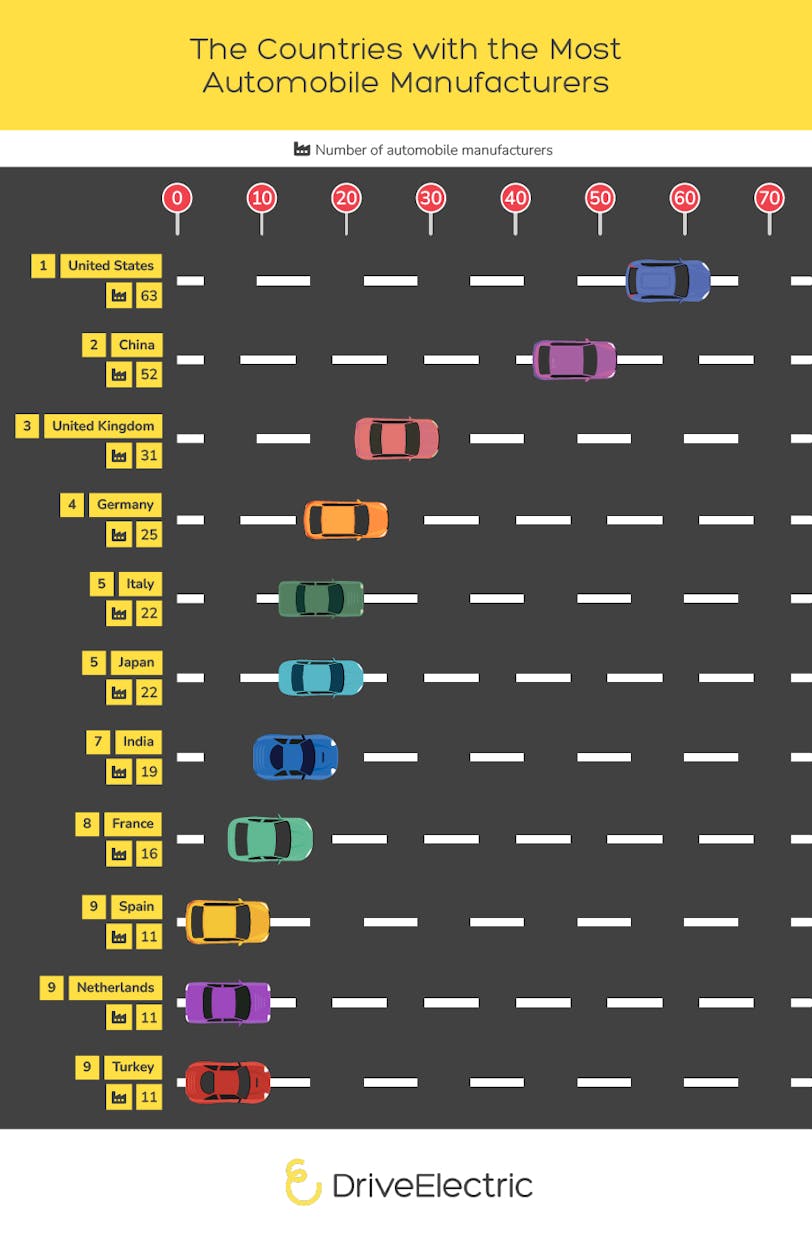
1. United States
Number of Automobile Manufacturers: 63
In the US, the automotive industry began in the 1890s, and due to the size of the domestic market and the use of mass production, it rapidly evolved into the largest in the world. The US is the first country in the world to have a mass market for vehicle production.
2. China
Number of Automobile Manufacturers: 52
The automotive industry in China has been the largest in the world by unit production since 2008. While most of the cars manufactured in China are sold within China, exports account for 11.5% of total production, which reached 3.11 million units in 2022, making the country the world's second-biggest car exporter.
3. United Kingdom
Number of Automobile Manufacturers: 31
The UK’s automotive industry is best known for its premium and sports car marques, including Aston Martin, Bentley, Jaguar, and McLaren, to name a few. In 2018, the automotive manufacturing sector reported a turnover of £82 billion. Around 168,000 people in that year were directly employed in automotive manufacturing, and a further 823,000 people were employed in automotive supply, retail, and servicing.
Methodology
We collected the share of EV battery production by country for the top 10 producing countries using Visual Capitalist.
We sourced car production figures by country using OICA’s 2022 car production statistics.
We sourced automobile manufacturers by country using Wikipedia to count the number of manufacturers by country.
Both Russia and Israel were removed from the data due to ongoing conflicts.
We used IEA’s global data explorer to look at each available country’s EV charging points (publicly available fast), EV sales as a % of the national total, and the annual increase in EV sales from 2021 to 2022. We took each country’s results for every factor and then normalised them against each other to receive a score out of 10.